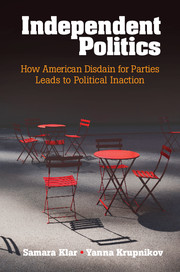Book contents
- Frontmatter
- Contents
- List of Figures
- List of Tables
- Acknowledgments
- 1 Independents in Name Only
- 2 Inside the Mind of an Independent Voter in America
- 3 How Do You Like Me Now? The Desirability of Political Independence
- 4 Everybody Hates Partisans
- 5 Partisanship and Political Participation
- 6 Undercover Partisans in America
- 7 The Myth of Partisan Compromise
- 8 The Partisan Underground in an Era of Polarization
- Appendix
- References
- Index
4 - Everybody Hates Partisans
Published online by Cambridge University Press: 05 January 2016
- Frontmatter
- Contents
- List of Figures
- List of Tables
- Acknowledgments
- 1 Independents in Name Only
- 2 Inside the Mind of an Independent Voter in America
- 3 How Do You Like Me Now? The Desirability of Political Independence
- 4 Everybody Hates Partisans
- 5 Partisanship and Political Participation
- 6 Undercover Partisans in America
- 7 The Myth of Partisan Compromise
- 8 The Partisan Underground in an Era of Polarization
- Appendix
- References
- Index
Summary
“I don't like either political party. One should not belong to them – one should be an individual, standing in the middle. Anyone that belongs to a party stops thinking.”
– Ray Bradbury, writerBy the end of this chapter the reader should reach one conclusion: people dislike partisans. One might even go as far as to say that people hate partisans. When the two parties debate and disagree, people start to view partisans in a negative way. They do not want to work with partisans, they do not want to live with partisans, and they think partisans are generally unattractive, incompetent, and unlikable.
This may not seem surprising given the results in Chapter 3. After all, we show that there is a prevailing belief that being independent is more socially beneficial than being a partisan and, more importantly, that people shift away from partisan labels to make a better impression on others. But the level of dislike for partisans that we demonstrate in this chapter should be surprising for a number of reasons.
First, the extent to which people dislike partisans is surprising given the importance that political scientists often place on political parties. Political parties are considered the backbone of the American democratic process, the sorting mechanism by which voters’ preferences are translated into governmental outcomes (Aldrich 1995; Schattschneider 1942). In addition, partisans are often more likely to be politically active (Verba et al. 1995), and political participation is something that academics consider a good thing (Holbrook and Krosnick 2010). Partisan debate is widely considered an important component of any healthy democracy.
Second, a preference for one option need not translate to a dislike of the other alternative. A person, for example, may prefer Coca-Cola but have little ill will toward Pepsi and may even be willing to drink Pepsi if it were the only option available. Similarly, a person may believe that the label “independent” is a more socially beneficial signal but might also view partisanship as a moderately desirable (or at least relatively neutral) label. But, as we will demonstrate in this chapter, this is not the case.
- Type
- Chapter
- Information
- Independent PoliticsHow American Disdain for Parties Leads to Political Inaction, pp. 61 - 82Publisher: Cambridge University PressPrint publication year: 2016

